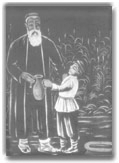 In eastern Georgia, there is village named Mirzaani. Nikolay Pirosmanashvili was born there, the fourth and last child of Aslan Pirosmanashvili and his wife, Tekle Toklikashvili. When Niko was born there were around 300 people with the family name of Pirosmanashvili.
In eastern Georgia, there is village named Mirzaani. Nikolay Pirosmanashvili was born there, the fourth and last child of Aslan Pirosmanashvili and his wife, Tekle Toklikashvili. When Niko was born there were around 300 people with the family name of Pirosmanashvili.
The birth date of Niko Pirosmanashvili is unknown. Different sources give different dates - 1851, 1862, 1863 and 1867. His birth registration (Then it was a registration in a church registration book) has not been discovered, which is rather strange. Aslan Pirosmanashvili, Niko's father, was a respected person in his village and according to legend, grateful villagers presented him with a track of land as appreciation for his great help in the struggle against Lezgines, who used to kidnap children from Mirzaani. Aslan's Shadow is the name of the land.
The most accepted year of the painter's birth is 1862. In 1890 Niko Pirosmanashvili got the job for the Georgian Railways, and the office clerk made a note: "Nikolay Pirosmanashvili, 28 years old".
At any event, the land nor the glory could help Aslan Pirosmanashvili survive. In 1870 he took his family and moved to village of Shulaveri, where he was hired to take care the vineyards of a rich Armenian merchant, Ahverdi Kalantarov. Aslan worked with his eldest son, Georgi. Georgi died suddenly and immediately afterward his father also died. Soon, there was one more funeral in the Pirosmanashvili family. Tekle, Niko's mother, passed away from her grief, according to relatives.
Three children, Mariam, Pepe and Niko, became orphans. Mariam got married and moved to a neighboring village. Pepe came back to Mirzaani, and Niko was taken by the Kalantarov's family, where he lived for many years. According to one legend, Tekle asked the Kalantarovs to take care of her son after her death. Another legend says that Niko went to Tbilisi in order to find a place to live and work, and that's how he appeared with Kalantarovs. Anyway, his life was connected to the Kalantarovs from approximately from 1872 until 1890.
In this family Niko was treated rather like their own than like a servant. He had his own room. He was taken wherever family members went to the theatre, museum, or for visits. His clothes were of the same quality as the clothes of other family members. He could study, read and write Georgian, and later on, Russian. When he wanted to get a profession he could start to learn it.
The Kalantarovs cared about Niko. They knew that he liked to draw, so from time to time he got paper, brushes and colours. He was strange, and old Ephrosine Kalantarova, the mother of the family, worried about him. She said, �He dreams too much, he can become mad like this...�.
He was strange and didn't care about anything but painting, which was the main thing that people who were near Niko remembered about him many years later. He was very naive and would trust people too easily, but some small thing could hurt him very deeply. Once Niko rushed home and burst into tears, complaining about children from outside who called him a wimp. Family members failed to comfort him, and for a long time after that incident, Niko refused to go out to play with other children.
When Niko was around 19 years old, he moved to the house of Elisabed Hankalamova, one of Kalantarov's daughters. Elisabed, a young widow of 30 years of age, just came from Baku with her son. Elisabed treated Niko as her younger brother and was astonished when she got a letter from him, a love letter, where he asked her to marry him. This letter was passed from hand to hand because no one accepted it as serious, just as more proof that Niko was strange. Embarassed, Elisabed didn't know how to react. Even though nobody showed it, Pirosmani felt that he had to leave her house. He moved to Kalantar Kalantarov, Elisabed's brother, and stayed there for two or three more years.
Niko's position in Kalantarov's house was strange and uncertain. Not servant, not companion, not family member... No income, no profession. No position in fact. No future.
During years Niko spent with the Kalantarov family, he made attempts to start his independent life. A few times he tried to start his business as a painter who makes shop signs, but he failed. Then finally in 1890 he got conductor's position at the Georgian Railways, and left Kalantarovs forever.
|





